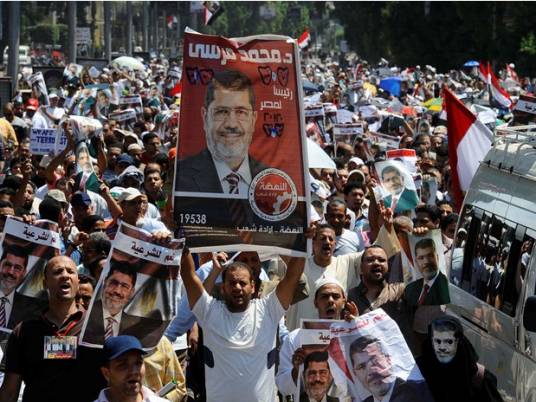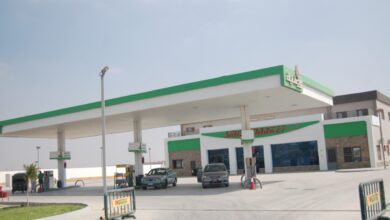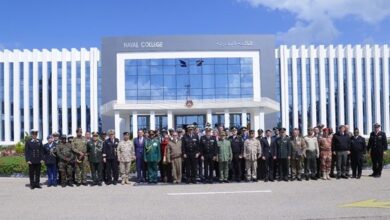
Supporters of Egypt's ousted president Mohamed Morsy urged fresh rallies on Friday, raising fears of renewed violence as police prepared to disperse their Cairo sit-ins amid international appeals for restraint.
The call came as US Secretary of State John Kerry said the military's removal of the Islamist Morsy — Egypt's first democratically elected president — had been requested by millions.
Kerry's comments are the closest Washington has come to publicly embracing the July 3 coup that toppled Morsy, as European diplomats held talks in Cairo with the interim government and Morsy's backers seeking a way out of the impasse.
Kerry told Pakistan's Geo television: "The military was asked to intervene by millions and millions of people, all of whom were afraid of a descendance into chaos, into violence."
"And the military did not take over, to the best of our judgement — so far. To run the country, there's a civilian government. In effect, they were restoring democracy," he added.
Allaa Mostafa, a spokeswoman for the pro-Morsy Anti Coup Alliance, told AFP that demonstrators would "continue our sit-ins and our peaceful protests" against what she termed a "coup d'etat".
Morsy backers rejected an earlier interior ministry offer of a "safe exit" if they quickly left their Cairo protest camps, as police discussed how to implement orders from the military-installed interim government to end the protests.
In a statement, the ministry called on those in Rabaa al-Adawiya and Nahda squares "to let reason and the national interest prevail, and to quickly leave".
The ministry pledged "a safe exit and full protection to whomever responds to this appeal".
The state-owned Al-Ahram newspaper, quoting police sources, reported Friday that police have prepared a plan to end the sit-ins, but had not decided when, as the cabinet was still hoping for a peaceful resolution.
The stand-off raised fears of new violence less than a week after 82 people were killed in clashes at a pro-Morsy rally in the capital.
More than 250 people have been killed since the president's ouster following nationwide protests against his single year in power.
Meanwhile, diplomatic efforts to avoid further bloodshed gathered pace, with the European Union's Middle East envoy Bernardino Leon and German Foreign Minister Guido Westerwelle both in Cairo to urge the rival camps to find common ground.
A senior member of the Freedom and Justice Party, the political arm of Morsi's Muslim Brotherhood, said the European envoys asked them to end their sit-ins.
"All the European delegates have the same message; they are pressuring the anti-coup protesters to disperse the sit-ins," said the official.
After meeting Muslim Brotherhood representatives, Westerwelle warned that the situation was "very explosive". "We have seriously and adamantly pressured for a peaceful solution. I hope that those concerned have gotten the message," he said in a statement.
"The international community has to keep up its diplomatic efforts, even though we don't know today whether these will prove successful."
Kerry also warned against further violence, saying the US was "very, very concerned" about the killing of dozens of pro-Morsy protesters in clashes with security forces and warning such loss of life was "absolutely unacceptable".
Amnesty International condemned the cabinet order as a "recipe for further bloodshed" but Egypt's foreign trade minister Munir Fakhry Abdel Nur said a government order to disperse protesters did not "give room for interpretation".
Accusing Morsy supporters of being armed, he told AFP: "It is clear the interior ministry has been given the green light to take the necessary measures within legal bounds."
Egypt's interim government also faces an increase in militant attacks in the restive Sinai Peninsula, where gunmen on Thursday shot dead a policeman in the northern town of El-Arish.
Further raising tensions, three top Brotherhood leaders, including Supreme Guide Mohamed Badie, are to be referred to trial for incitement to murder.
Morsy himself has been formally remanded in custody on suspicion of offences when he broke out of prison during the 2011 revolt that toppled former president Hosni Mubarak.
He was detained hours after the coup and is being held at an undisclosed location, where EU foreign policy chief Catherine Ashton met him on Tuesday, later telling reporters he was "well".




